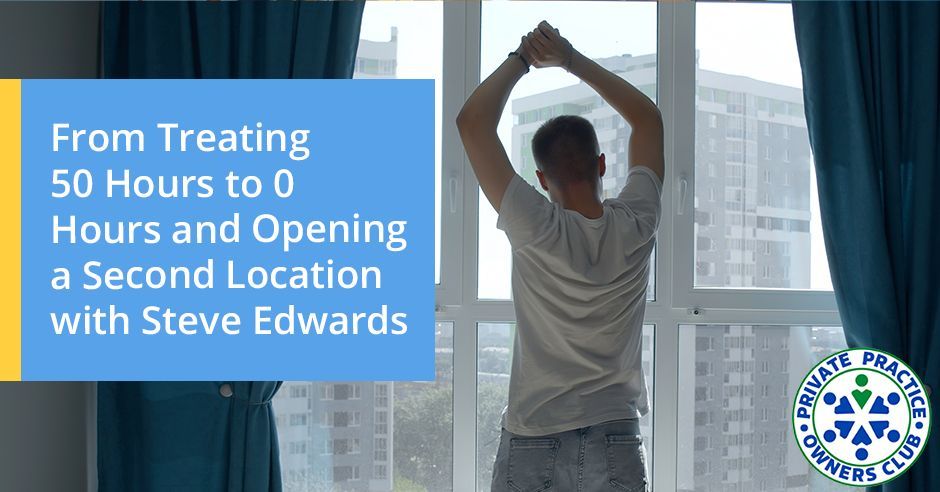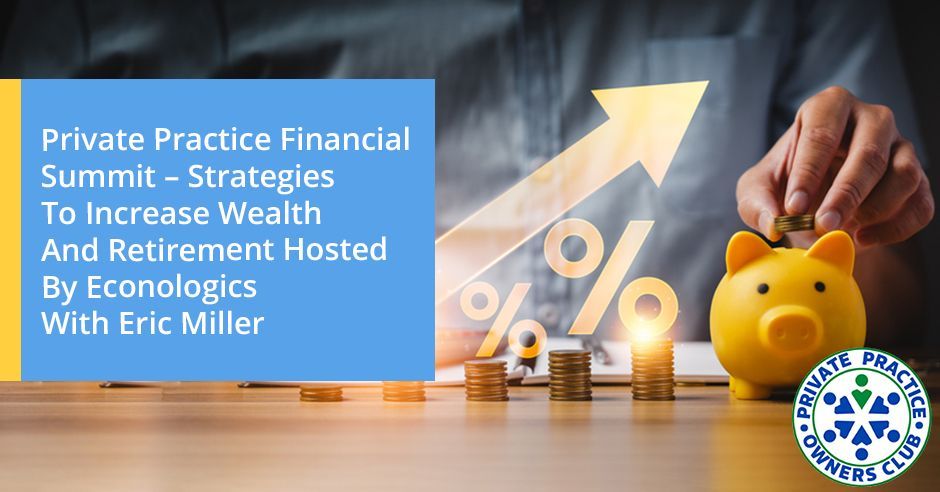Tracy Bond has successfully expanded her practice from three to five clinics while stepping away from day-to-day operations—an achievement that speaks volumes about her leadership. Today, she reveals how implementing a structured bonus program skyrocketed staff productivity, improved retention, and increased profitability.
In this episode of the Private Practice Owners Club Podcast, Nathan Shields welcomes
Tracy Bond, a seasoned private practice owner and head coach at the Private Practice Owners Club.
Episode Highlights:
- Why Tracy waited two years before introducing bonuses—and how it changed everything.
- The key metrics that determine whether a bonus program is financially viable.
- How to get staff buy-in and avoid resistance when rolling out a new incentive structure.
- The critical mistake most practice owners make when setting bonus amounts.
- How front desk, billing, and clinical staff can all be incentivized effectively.
Whether you're just starting or looking to refine your incentives, this conversation will help you craft a program that works for your practice.
Ready to build a practice that runs without you being in the trenches every day?
Visit our Linktree for Coaching Services, our Free KPI Dashboard, and more: https://go.ppoclub.com/linktree-podcasts
Love the show? Subscribe, rate, review, and share! https://ppoclub.com/
---
Listen to the Podcast here
Establishing Bonus Programs That Incentivize Productivity With Tracy Bond, Coach Of PPO Club
I have got one of our great head coaches of the Private Practice Owners Club coaching program, Tracy Bond. She's also the Owner of
The SpOT Clinic.
It's Speech, PT, and OT, however you slice it.
You do pediatrics. You've got 3 soon-to-be 5 clinics in Alabama. This is why we love to have you. Tracy has nothing to do with her clinics at this point. She has stepped aside and let the leaders take over. That in and of itself should tell you a lot about her capabilities as an owner and the experience that she brings to a conversation like we are going to have. Thanks for taking the time and being willing to talk to me.
I’m looking forward to it.
As I talk to potential guests, the question that I ask them typically when we are trying to decide what topic to speak on if they don't come prepared with one is what lights you up? What gets you excited? What are things that you like talking about that you could expound upon and not feel like it's taking a lot of brain energy to do so?
I was excited when you said that you wanted to talk about bonus programs and maybe highlight your bonus program, because thinking back, I don't think we have had an episode dedicated to some examples of bonus programs that owners are sharing with their teams. We have talked about it in different episodes, but to spend an episode on it is cool.
Starting A Bonus Program In Your Business
I'm excited to know what you've got and what you can share. I will share also what we have and go from there. To start the conversation, tell me a little bit about when you decided that you needed to start a bonus program. Did you have this idea from the very get-go before hiring your first person? What kicked it into gear?
I didn’t when I hired my first person because, at that point in time, I was flying by the seat of my pants. I did not start coaching until about a year in. That is when I got a coach.
You hired a coach a year into ownership?
Yes, and I opened in 2019. COVID hit. I didn't because I didn't think about it. All of these things are ever-evolving. I add things and change things all the time. That's a good point to make. The other thing that's ever-evolving is job descriptions because you change job descriptions for people all the time. I was probably about two years in before I started bonusing. The biggest reason is because we wanted to make sure the company was viable.
Our bonuses are there as long as the company is making money, making a profit, and is a viable company. That has been a stress to employees. Luckily, knock on wood, we have not had to cut bonuses. Hopefully, we won't see any Medicaid changes that will cause us to do that, but we don't know what's going to happen.
We are going to keep it as is for the time being.
Did they approach you about it or were you seeing a drop in production that you needed to incentivize? Did you, through coaching, recognize this would be good to incentivize than to produce more?
That was it. The coaches gave me some guidance on how to do it. I started out bonusing therapists and then went through the whole gamut. A few years ago, I started bonusing all the staff members, except our techs are not bonused.
We always had a hard time coming up with a real KPI for our techs because they are so intricately involved. We judged the tech's capability to get the therapist out of the clinic at approximately the same time that the patients walked out of the clinic at the end of the day. How do you bonus that? I don't know. I know what you are talking about. I'm glad that you highlighted something. If someone's starting a bonus program, I wouldn't expect them to cover bonuses across the board. If this is your first time dipping your toe in the water with bonuses, you might want to stick with providers. Let's try to smooth that program out before we spread it across the clinic.
Do a very small bonus. Mine may be higher than yours, but that doesn't mean that's what you need to do. Most people I have found are glad to get anything. It shows them that their work is valued. I would not start out with a big number. You want a number that you can grow into.
How To Determine Bonus Amounts Effectively
As people are considering, you brought up the amount in which you have a bonus. I'm sure there are tiers to it. How did you fall upon that number?
A lot of it was calculations. We had to look at revenue per visit to make sure that we were covering salaries and overhead.
You had to know your cost per visit. Know your cost per visit and your reimbursement per visit on average. I can imagine the calculations you went through because you had to figure out, “Based on the average provider salary that we currently have, what are they producing? What is the breakeven point?” Breakeven covers all the expenses plus 10% to make sure you are generating something.
For us, it was the per-week visit number. There were so many visits per week. I don't know how you did it. We knew what that number was, and then we knew that if they went maybe 10% above that, which equated to 5 visits more per week, then we were willing to start bonusing. Does that sound familiar or did you do something different?
I have heard people who do that. I played with this for a long time. To be honest, I knew nothing about statistics until I started coaching. I was surviving. Learning statistics was a big thing for my company.
It made a big difference, I'm assuming.
It made a huge difference. The way I bonus all clinicians is a convoluted way, but I will explain the why first. I had one clinic that was always a lot more productive than the other two and I paid hourly. If they had a cancellation, they didn't care. They could talk to somebody else or be on their phone or whatever.
They still got paid if someone canceled?
Yes. The only time that they didn't get paid is if the first one of the day or the last one of the day was canceled. They'd come in late and leave early. That was when they'd get paid. Looking at that, I saw my clinic which was 80% productive overall versus my clinic which was 65% productive overall. I was like, “They are getting paid the same amount. I’ve got to do something.”
I had started a bonus structure similar to yours and it was so stinking complicated for me to figure out I'm not a numbers person. I'm learning the stats as I go. When I started looking at it, I started doing the same thing. I was looking at productivity and that kind of thing and then bonusing on that. I didn't feel like the bonus I was giving was good enough for those people who were performing well, so I sat down and tried to think, “How can I change this so that everybody is getting paid based on their work?”
I looked at all of the data and saw exactly what we needed to cover everything and profit. I also added in a little bit for growth. They are going to be asking for raises and a bonus increase, so I also figured in about 15% for that one. That's how I started, and then I said, “I know what I want to do. Now how do I do this?” That's when we came up with those numbers.
Do you bonus on the number of visits per week, the number of units per week, the total amount charged per week, or something like that?
We do units per week.
We didn't include modalities as viable units. I'm assuming you are the same.
No, we can bill everything. We are one-on-one with our kids.
We use electrical stimulation, ultrasound, and stuff like that. Those wouldn't count towards your units billed per week.
Ours is anything that's billed, we count.
They have to meet a minimum number of units billed per week. I'm sure there's a baseline level to justify their job, but then there's another X percent more in order to get the bonus.
What I did was I had all of my staff tell me how many hours they wanted to work. It could be twenty, forty, thirty, or whatever. “Tell me how many hours a week you want to work. That is set in stone. Unless you come back and want to change it for the next payroll, it's set in stone.” Once everybody told me that, I went to their hourly rate and cut everybody's hourly rate by 25%. We had an uproar for a while. The way I explained it was, “With this bonus program, the more productive you are, the higher your bonus is going to be and you are going to make more.” What we did was if somebody worked 40 hours a week, they had to be 50% productive. They had to bill twenty hours a week for a base pay.
To justify their decreased salary?
Yes. For example, if they made $40 an hour, then they are making $30 an hour. After that, 50% of every unit they bill above that, they are bonused. This is depending on everybody's numbers. Everybody has to be different. For speech, it might be $20. We are untimed. Thirty minutes is a speech session. For OT and PT, PT is $9 and OT is $7. That's based on reimbursement and that's per unit. That's times four.
The way we did that was when I announced it and had all of these people up in arms, I decided, “I'm going to give you six months to fill your schedule. You don't have to do it for six months.” My productive clinic said, “We want to try it now. We'll be your Guinea pigs.” They started it two months after I announced it.
We gave them a spreadsheet. On that spreadsheet, they could put in how many hours they were scheduled and what their previous hourly rate was. It calculates what your new salary or new hourly rate will be, what the current base is, and how many units they need to hit 50%. They then could go in and add the units that they billed for the week and it would tell us how many units they billed over that 50%. Over that 50%, they would get the bonus.
What we wanted to do with this and why we let them do this was because we wanted to prove to most of them that they would be making more if they increased their productivity. It has worked extremely well. June 2023 was the deadline. The first clinic started in February 2023. Oddly enough, I had all of my therapists other than two go to the bonus structure before June, so they all saw how much they were making. Some of them were making $400 or $500 a paycheck more. I can afford to pay them that because they are 90% productive.
I was going to ask you what productivity changes you saw.
Huge.
Most people are glad to get any kind of incentive. It shows their work is valued. Start with a number you can grow into.
The 60% productive clinic went to what? What are they averaging?
They are about 83% overall.
It sounds like the 80% clinic went to 90%. That's amazing. That is so cool. Sometimes when clinics are running hot like that, they are 90% productive. There's a lot of complaining or whining, if you will. They’re like, “We’re so busy. I can't keep this up,” or that type of thing. When they know that their paycheck is tied to their production, some of those complaints tend to fall by the wayside. Did you see the same?
Yes, I sure did. What we told them was, “We are going to let you have some autonomy in this. You are going to be over the hours that you want to work and whatever productivity you want. You have to be there for that number of hours. If you want to bill 20 hours out of 40 hours, you can get your base pay.”
“You get your base salary that was 75% of what you had before.”
Yes. We were like, “If you want more, you have to work for it.”
You did a little bit of a hybrid there. When I say hybrid, it's a smaller base salary and on the backend a greater reimbursement rate either via bonuses. It's not an eat-what-you-kill model, which is completely based on production. I have had that interview before in the past with some owners. They took the same approach that you did.
They didn't say, “This starts tomorrow. They said, “We are going to show you what the benefit is over time. You can opt-in whenever you want, but we are going to show you based on your current production levels and what you could produce more how that would affect your take-home pay.” That tended to turn a lot of minds. Some people were like, “I know I can make $200 a week more, but I like the security of the salary.” Some personalities are like that. What are you going to do? You want to feed your tigers. You’re more than willing to pay them more and let the other ones get what they get.
Implementing Effective Cancellation And Rescheduling Policies
We implemented a policy. I always have a mantra every year for my staff. This was in 2023. My 2023 model or mantra was, “Own your own caseload.” We trained the therapists that when they had a cancellation or no-show and the front desk couldn't reschedule them, it's their responsibility to call and see if they can get them rescheduled because every cancellation is money out of their pocket.
We have a script. The front desk never asks, “Do you want to reschedule?” It's always, “We have appointments at this time and this time. Which one of those works for you?” Sometimes, we still get noes. If we get noes, we have the therapist call and say something like, “Johnny was here and he was working on Rs. He was doing a great job on those. I’d hate for him to miss a week and possibly slip back a little bit and have to learn all this over again. I would love to get him in. I know he was proud of himself. We were proud of him. I have appointments this time and this time. Which one works for you?” The therapists are responsible for filling their caseload, too, and making sure those cancellations and no-shows are rescheduled.
I like how you gave them control over their caseload because the default mentality for most therapists is, “Patients come to me. I can't control it. If they cancel, what am I going to do if they are sick? So-and-so went to the hospital, or, “Bring me a new patient. If we are not getting new patients, that's your job. Where's the marketing department? They need to bring me new patients.”
Giving them ownership of their caseload changes the dynamic, the mentality, and the attitude towards that. Giving them control and giving them responsibility for the product, i.e. their paycheck, they can say, “If I step in now and take control of my schedule, they will see benefits.” I know what the conversation was around that, but it's also part of telling them, “When you step in and control your schedule, your patient's results get better.” It sounds like you didn't necessarily tie it to patient results, but have they recognized that over time?
We haven't tracked that simply because with pediatrics, we see these kids for years.
I can see the difference.
It's hard to have a track on that. The other thing that helped us get the therapist on board was we pointed out, “When you are talking to parents and trying to get them back on the schedule, it shows them you care. You care about their plan of care and you want to see them and make sure that they are coming in.” Also, it hurts another child if we have a waiting list and that child can't get in. It also hurts the therapist, their bottom line. There are three little branches off of that. It worked well for us.
I have seen the same thing either with personal experience or those of others that I have talked to that when the provider makes the call, the patients appreciate it, frankly. Those providers that take that call seriously tend to have lower cancellation rates. It's all in the scripting. It's how they say it. They need to come across with care. They need to come across with a focus on patient results.
Some of it is like, “Do you remember that at the initial evaluation, we agreed to this plan of care that was such and such frequency over such a period of time? If we are not able to agree to that and stay true to it, then I cannot guarantee you the results that you are hoping for. We need to be in agreement on this together if there's some conflict.” One of the nuances is not, “When do you want to reschedule?” I hated when my front desk asked the question, “When would you like to reschedule?” Rather, it is, “We have days and times available here and here. Which one would you like to take?”
We got in the habit of saying, “Do you want to reschedule?” That is a yes-no question. I was like, “That's not working for me.”
That doesn't work because people will typically default to no.
That's exactly what I told them.
I love how you laid it out. I wish we would have done the same, but this was so long ago, to say, “You guys are busy. You are doing your thing. This is what it's going to be like.” Ours was simply a bonus program. I like how yours was tied to increased production. We tried to help them understand that we wanted to recognize their increase in production. We especially wanted to recognize when maybe they took on a few extra patients because someone was on vacation. If you are going to put in the extra hours to see the extra visits, then we want to bonus you.
Incentivizing Productivity And Salary Control
I will tell you what else that's helped with. If somebody comes to us for a raise, we look back and see what their bonus has been for the last year and what their average productivity has been. If they have been on average 80% productive, then we say, “Let's figure this out if you were 85% productive. I want you to control your own salary. I want you to make as much money as you can make. Don't leave money on the table. This year, let's see if we can get you up to 85% or 83% because you'll make X number of dollars more, which is equivalent to or more than what you are asking for anyway.” We haven't given raises in a couple of years.
They can control it themselves. When they are asking for a raise, are they asking for a raise on the base salary or are they asking for an increase of the benefit per unit?
They are asking for an increase in bonus.
They want to be bonused more. That's hard to do if they are stuck in the 60% to 75% production range.
If they are 60% or 70%, they are probably not going to make as much as when they were on the old salary and bonus structure. They pretty much have to make 75% or better percent. At 75%, they break even with a few dollars here and there, but by 80%, they are seeing a difference in their paycheck. At one point in time, I even had some that were 95% productive. She was trying to buy a house and she was trying to get as much money as she could. She would get off the clock to do notes and do all of these things that she could do off the clock. I had to put a cap on it. I said, "We are capping at 90%.”
The other thing that she did was she would say, “I don't have time to call patients. I don't have time to clean. I don't have time to do this.” I said, “That's part of your job. We have to have everybody participating in those things, too, so let's cap it at 90% unless there are extenuating circumstances that your manager can determine from there.
You can always override, but there's a conversation. Everyone knows ahead of time. It's approved, especially if vacations and sick days come into play.
It's huge to pay them every paycheck. I was doing the bonuses quarterly. That was why it was taking me so long. We were doing it every paycheck so they see that extra money coming in every two weeks.
We had the same thing. They got bonused per week, but that bonus accumulated over the two-week payroll period. They got paid every paycheck. I have had some people that do fine paying it quarterly. We had David on the group call who said he allows them the opportunity to track their bonuses on a regular basis, but when he pays out, he pays that quarterly bonus. Whatever works for you. There's nothing set in stone here.
What's important is to not get too complicated. Tell me if your providers are able to. Are they able to track what their bonus is going to be at the end of the week? It shouldn't be rocket science. You show them the formula or, “If you hit this number, you get X amount of dollars. If you hit this many units, you get X amount of dollars,” and they are able to track it themselves. If they are not able to do that, then the bonus is this ethereal thing where they are like, “Maybe I get a couple hundred bucks next week.” You want to make it available to them so that they understand exactly what they are going to make when that paycheck hits.
The spreadsheet that we provided them to show the difference between their old hourly rate and their current one with the bonus, they can do that every week if they want to.
Adapting Bonus Structures For Clinic Success
They are doing the same calculations you are doing. That's super important and important to highlight. You don't want to make it super complicated. Make it something that they understand. They can figure it out themselves. That's great. I love how you did it because it incentivized things. We saw the same thing. When we bonused with visits per week, they still had to meet a certain number of skilled units per visit. Yours inherently does that because as they max out the units, they are going to get a higher bonus.
Ours were visits per week, but they still had to hit a minimum average of skilled visits per week. You couldn't see the number of patients that we wanted to see and bill two units for an hour of care. That doesn't work. It goes back to your thing about how it has to be viable for the company in order for this to work. To get back to something that you said before we pushed record, you are presenting it like, “We plugged this in and then it worked for the last couple of years.” You told me you've had to go through a few iterations of this to get it right.
Probably more than one hand. Over time, it has changed a lot. In the beginning, it was only bonusing therapists and it was quarterly. It was completely crazy to keep up with. It evolved a little bit to us paying hourly. This bonus was teeny-tiny and we paid monthly. It has evolved to the weekly thing that works better and it's working, but that's for my clinic. Everybody has to do exactly what's best for their clinic. These are examples.
Without using these words, how did you tell them that you reserve the right to change the numbers and the bonus structure at any given time? How did you get that across?
That's part of the policy. It's in the policy.
That you have the wherewithal to change this at any given time, that they will be given plenty of notice, etc., that kind of thing?
Yes.
They are like, “I'm getting whiplash. You are making all these changes.” You are like, “This isn't perfect.” I started putting that phrasing before we changed any program towards the end of my ownership. It was like, “We are going to try this out. We are going to see how it goes. We want to make sure it works for everybody. If it doesn't work for me, I reserve the right to change it. If it doesn't work for you, then we'll have a conversation and we can change it again. Are we clear that this isn't perfect and we are going to try it?” We can say that for any program we are going to roll out.
Bonus programs prove that increased productivity translates to greater income.
We let them know that the company has to be viable. The only way the company is viable is for them to put in the hours, see as many kids as they can, and help as many families as they can. That goes for everything. After five years, it's still ever-evolving. We always say, “Here's the policy as of now, but there could be a change.”
We implemented a staff initiative group with all the disciplines. What we were finding is we’d put out a policy and then we’d have all these complaints back. We decided to put this committee together to be able to look at each policy. Instead of sending one out that was like a rough draft and we'd have to send it back, we looked at them coming in. They come in once a month. We changed all policies that were new to go out once a month.
At the beginning of the month, they would all go out. In that meeting, we would have all the staff members review the policy, ask questions, and clarify anything that we needed to add so that when it went out, it was set in stone. That empowered our committee members to handle some of the questions and complaints because, at that point in time, they knew why we were doing this. They helped write it so they are accountable, too.
Bonus Strategies For Team Members Beyond Providers
That’s a cool idea. We talked about bonus providers. Give us some general ideas on how you're bonusing other members of your teams.
Front desk staff in Alabama don't make a whole lot of money. We try to bonus them a little bit and they appreciate everything. What we do is for every person they reschedule in the same week, if somebody cancels on Monday, as long as they are in by Friday, they get paid $3 per reschedule. If they reschedule for a different week, like if they are on vacation and have to schedule the next week or whatever for makeup visits, then we give them $1 per cancellation or reschedule. The front desk is always rescheduling 20 or 30 patients a week. They can easily make an extra $60 a week, which is good for them. We can encourage them to own that caseload as well and try to get those people in. Although it was small, they appreciated it.
Ours was they had to hit a couple of metrics. The arrival rate had to be above a certain percent. Their over-the-counter collections rate had to be over a certain percentage.
Ours is 100%. Everybody who walks in does not leave without paying.
What's your secret?
I didn't give them an option.
I have been pushing people to put credit cards on file. That makes it super easy. Do you do that same thing or are they pulling out their credit cards every visit?
We have one clinic that pretty much bills credit cards every day, one clinic that's about half and half, and then one clinic that's about 25% with credit cards on file. The two that are not 100% say, “People don't want to leave credit cards.” If that's the case, we use Square or Stripe and all these other ones and run their credit cards. Some of them pay cash. Some of them write checks. They have to pay something. When the first of the year rolls around and everybody's deductible changes, at that point in time, we also charge a little bit more to start whittling down that deductible. Once their deductible is paid, they go back to whatever the copay is.
What if they don't come prepared to provide their copay?
They are not staying.
You don't let them back.
In our new client handbook, that is a policy in there. They know you pay every single time you come in. When you go to the doctor's office, you pay. We are the same way. The only difference is we can only see one patient at a time whereas doctors can stack patients.
Good for you. We had some different metrics for the front desk. Who else on your team gets bonuses at this point?
Our clinic managers are bonused. We look at metrics for them. We want them to make sure that the arrival rate is up there. We want to make sure they are at 90% and they can follow up with their front desk and the therapist to get it up there. We also look at the number of therapists that are meeting 75% to 80% productive. 80% is for non-evaluating therapists and 75% is for evaluating therapists. We plan to probably bump that up in the future. Most of them are doing more than that anyway. The number of cancellations and no-shows that weren't rescheduled, in-house referrals, and the average treatment charge.
Do they get a bonus on each of those metrics or do they have to hit all of those metrics in order to get the bonus?
If they hit 3 of those 7, they get this amount. If they hit 4 of these 7 they get this amount.
That's a flat rate?
Own your 85% productivity. Make as much money as you can make and do not leave money on the table.
Yes.
Our clinic directors could not only get the visits per week bonus as treating providers, but as clinic directors, they also could get bonused. We had a profit-sharing program, frankly. If the clinic was XYZ profitable, then they could get a bonus for that. They could get the weekly bonus but the profit sharing was usually a quarterly thing.
We probably need to share a conversation about that because I would love to do that. I may be picking your brain.
You want those higher-level people like your clinic managers to benefit from leading the team. You want them to get a financial bonus for leading the team and the team hitting certain metrics. You want them to be a part of that. That’s important as well. Especially for your leaders, how do they get bonused? If the people over their purview are a large group, then maybe they should get a bonus on the production of that large group.
With our credentialing coordinator, what we want her to do is have all of the credentialing paperwork in from the day they sign the offer letter to six weeks after employment. If we are able to do that within those six weeks, she gets $25 per new staff member. She stays on it. She's on the phone constantly with Blue Cross Blue Shield and Medicaid to make sure they have everything they need and to see where she needs to follow up. We have decreased the amount of time that it takes to get credentialed significantly.
Is your billing team outsourced or are they in-house?
We do it in-house.
Do you have bonuses for them as well?
We do. We have ours divided into three. We have the front desk, intake, and billing. For our intake, we look at how many evaluations they scheduled within two days of getting the referral. If they show up for evaluation and they can get the paperwork in from the case history and all the paperwork they have to do on the first visit, then they get another bonus.
You are bonusing them to speed up the process and to have everything available. Power has an element of speed to it. The faster you can do something, the more powerful your clinics become.
With our front desk, we look at an advanced schedule. On Friday every week, we look at the following week's schedule to see how many visits we have. The next Friday, we look to see exactly how many came in. If somebody has canceled and they fill in that cancellation, it counts as a visit. We look at the total number of visits.
They get a bonus on that?
Yes. We talked about the copay bonus.
What about your billers? Is that related to your AR aging or how much they bring in? Is that related to your Average Reimbursement per visit or denials? What are some of the bonuses you share with them?
We bonus per insurance verification. They are supposed to verify insurance and get it back to our intake specialist to schedule within 24 hours. If it comes to them and intake gets them and can call, they get a bonus. The other thing is any denials that we get in, if they are resubmitted on the same day, they get a bonus. We want to make sure we are staying on that.
Luckily, we can get rid of the one that says we have to collect because we clicked on-site. That was something that was big because they would email or text back before we were doing that and they wouldn't get them. We were like, “You have to speak to a person. You can’t just text or email because they are going to say they didn't get it. You have to talk.”
The only thing that I could see might be an issue is what if I got the insurance verification in 24 hours but I wasn't good at it? Maybe I guessed it because I have worked with this insurance company a lot. We get denied and I turn it in 24 hours. They could get a bonused on both ends.
That comes back to training your front desk, your intake, and your billers to get everything complete.
Calculating Bonus Plans To Ensure Profitability
If this denial starts stacking up, then there needs to be some conversations. I get it. That’s very good. I love how you did all these things. I'm assuming you did calculations on all of this.
I did.
Before you implemented it, you didn't think, “$50 would be good here. $50 would be good there. $3 is good here.” I'm sure you probably ran the numbers, like, “If they hit these numbers, this is how it would affect my profit margin.” I'm sure you did some of that.
It’s like the therapist bonus and having to come up with what it was per unit.
Is that something you did or did you lean on your husband? I know he's a numbers guy. Did you leverage your bookkeeper or accountant? Who helped you through some of this?
I had my COO do it. She and I talked through it. She came up with some numbers and got back to me. We talked through that and then finalized whatever we were going to do.
You probably took a month or two to figure these things out before you even addressed them.
Probably longer than that. It was probably three months.
You took your time. It's not like, “Let's figure this out today and run with it next week.”
When I first started, I did that guessing game of, “Let's give $20 here and $50 here,” but when I first started before my coach, I lived from my bank account. I was like, “If I have got this amount in my bank account, I can spend this amount.” When I started looking at stats, I realized quickly that wasn’t going to work and I had to analyze those better.
That's a great reminder to people, especially if you are considering your bonus program, that you need to know your statistics and you need to run those numbers before you roll out any program. Feel free to take your time but leverage people who know numbers if you are not a numbers person.
A lot of speech pathologists aren't numbers people. I'm not sure about PTs. They are more analytical so they may understand numbers more.
It depends on the person, but we didn't get into physical therapy because we were numbers people, that's for sure.
That's how I am.
Thanks for sharing so much. Is there anything else you want to add to the conversation before we sign off?
Not that I can think of.
You covered a ton of stuff. Thank you so much for sharing. If people want to reach out to you, are you available, whether by email or social media?
Yes. My email is
Tracy@PTOClub.com. Also, I'm on Facebook as
Tracy Hayes Bond. They can reach me there, too.
Thank you so much for sharing. I appreciate it.
Thanks. Have a good weekend. Bye-bye.
About Tracy Bond

















